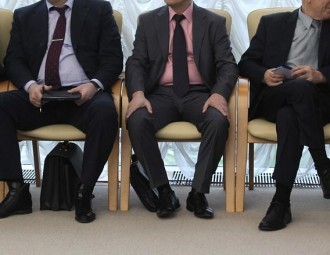Uladzimir Matskevich: Belarusan regime is getting ready for what is happening in Russia

There won’t be any drastic change of politics: slight Western reorientation will be preserved. The new membership of the government won’t resolve Belarusan economic difficulties.
It seems that cadre redeployment is a collective decision, to fulfill which people in power should have been changed. This is how Uladzimir Matskevich, the head of the Board of the International Consortium “EuroBelarus”, accesses the great revision of the government.
- Large-scale cadre changes have been referred to as “resignation of the government”. Lukashenka found his scapegoats responsible for foreign currency problems, didn’t he?
- Generally speaking, the appointments are quite odd. The change of people on top position in the state apparatus really took place, though it wasn’t bright. All the new “appointees” have long ago been on government service, so I can’t say that the new appointments will radically change the government policy.
As to the discharged Prime Minister Miasnikovich, Prakapovich, the head of the National Bank Ermakova, neither they blame themselves for the exchange problems nor Lukashenka does. There is no separate crisis in Belarus; but there is economic anchor to Russia. The current government won’t resolve Belarusan economic difficulties.
These appointments were most likely done with reorientation on the future. It seems that cadre redeployment is a collective decision, to fulfill which people in power should have been changed.
- Unfortunately, no one will bear responsibility for the crisis: Miasnikovich is to change his post to the Chair of the Council of the Republic, Ermakova and Prakapovich will head some other banks. All the “offenders” retained their seats. What was the sense to make officials change their seats?
- Relocation of Prakapovich and Miasnikovich has to do with their age and tiredness, as to restructure something, even if only slightly, more active people are needed.
Their retiring doesn’t deserve public attention.
- The former government has long ago earned their retirement, what was repeatedly mentioned by Lukashenka. But why did it happen on the New Year’s eve? It would be more logical to wait until full devaluation forecasted by the experts, and only then give dull Belarusan government to people to tear them into pieces.
- I can’t dispute the opinion of the experts, though personally I have somewhat different stance. I see no panic in the actions of the regime and no fear for crisis. The regime doesn’t seem to forecast total crisis next year. Of course, ruble devaluation and introduction of a 30% levy on purchasing foreign currency didn’t resolve the tasks that the government has. I think that slight panic was forced on purpose so that to prevent bigger panic. I don’t think that the new government will have to work in an extraordinary situation.
As to the retirement of the government, I think that it is better to announce the new course at the start of a new year. That is why all preparatory measures are introduced now, when people are busy with their own life, not with the replacements on the government.
- What is the mission of the new government that is to work for less than a year, i.e. before the “president election”?
- Lukashenka is planning to stay in power after elections, so for him there is no difference of how seats are distributed between the officials. We can’t also exclude the possibility that these people stay on top positions after elections as well. Even top-officials in Belarus have little power. Decisions are made so that the responsibility is collective.
There won’t be abrupt change in policy; slight western reorientation will remain. Russian crisis will only grow, so the country doesn’t have a worthwhile way to get out of the crisis. Belarusan regime is getting ready in order to overcome something similar to the Russian situation and is trying to mild the consequences of Russian crisis for Belarus. There will be collective responsibility for the consequences, as personalities have always been insignificant in Belarusan management.
- Belarusans see off the old year and meet a new one with a regular crisis that signals about the impossibility to cure Belarusan economy with administrative methods. Will the New Year crisis make Belarusan governments introduce reforms?
- The situation incites the government to certain changes, which still cannot be called reforms, but rather a slight insignificant change in policy.
Lukashenka’s principal attitude to business won’t change; neither will the social and political model: state capitalism, state property, and state ownership. Lukashenka is continuously repeating that the state property should bring more profit; while it is business that will have to be responsible for the situation in our country.
-
03.01
-
07.10
-
22.09
-
17.08
-
12.08
-
30.09








































